12-03-2024
The Role of Fuel Cards in Truck Tax Management
The Significance of Fuel Cards in Truck Tax Collection Trouble
Of the many task owners and fleet managers share in common, one glaring challenge buckling down on taxes for a truck would be the biggest. There are so many forms including Form 2290, IFTA (International Fuel Tax Agreement) and state taxes that it calls for a level of dedication that many may hardly muster when trying to manage costs and monitor fuel utilization. In recent years, however, fuel cards have become increasingly popular to assist with these issues as they provide a range of advantages other than making saves on fuel purchasing alone.
What Are Fuel Cards?
Also known as fleet cards, fuel cards are types of payments developed for the specialization of the trucking industry, which allows a driver to buy gas and receive other services and companies to supervise the payment and receive reports.
Simplifying IFTA Reporting
One of the heartbreaking moments within tax accounting practice in the trucking industry is preparing the IFTA reports which are fuel purchases and miles driven in multijurisdictional jurisdictions. Such barriers wouldn’t be the case owing to the following fuel cards simplify this process:
- Real-time Automated Tracking: Fuel cards capture the date, place, and volume of fuel bought allowing for instant valuable information for IFTA reporting purposes.
- Comprehensive Reports: Majority of fuel card providers assist clients with reports that show the states in which-buying fuels without self-accounting for the fractions.
- Minimizing Errors: Since fuel cards are capable of performing automated tracking processes, they assist in ensuring that the IFTA files are correct as well as filed on time due to very minimal or no errors.
Facilitating the Process of Form 2290 Filing
Form 2290, aka the Heavy Vehicle Use Tax (HVUT), has strict requirements for keeping up records such as for the amount of mileage and use of the vehicles. There are ways that fuel cards help in the following manner:
- Integrated Reporting on Mileage: Most of the fuel cards have some sort of integration with telematics, and therefore, know where the vehicles are at any given time.
- Classification of Costs: Fuel cards ensure that fuel costs are distinctly labelled in comparison to other costs meaning when it comes to tax returns, claims can be made more effectively.
Tax Deductions that are Hassle-Free
Fuel costs form a major percentage of overhead costs in a trucking business; however, they are generally tax deductible as well. To make matters worse, fuel cards assist in this procedures by:
- Simplified Fuel Cost Tracking: Since every fuel cost is recorded in one location, there is no stress of preparing for the tax season.
- Organized Fuel Costs Log: With regards to IRS tax regulations for record-keeping, many times fuel card systems come with their own digital fuel receipts.
Other Advantages of Using Fuel Cards
- Discounts: A number of fuel stations provide discounts to fuel card users allowing a reduction in the overall cost of operations.
- Increased Control: Fuel cards ensure that businesses do not incur unauthorized usage as these cards come with spending limits and PINs.
- Optimised Cash Position: Long runs typically incurr extra costs which need to be managed. Fuel cards can good for short term credit and help with the overall cash position.
Finding the Best Fuel Card for your Needs
Knowing criteria in choosing a fuel card will give you significant advantages from competitors in the trucking business. In particular:
- Coverage: Look out for the card acceptance in the fueling stations that are located at the routes that you normally ply.
- Backend Reports: Search for cards with good reviews because they can give good and adequate IFTA and tax reports.
- Expense: Assess monthly fee and transaction fee and other charges.
Fuel cards are far from just a payment mechanism, but rather they also serve as a very powerful tool in managing taxes for trucks. Time, minimize mistakes and achieve compliance with fuel cards that automate fuel cost tracking, simplify IFTA reports and file Form 2290.
The process of selecting a good fuel card will not only save on the operational side of the business but will also influence how well taxes are paid each year. For people who want to have a smooth time dealing with taxes regarding trucking, then a fuel card may be the answer.
Note: For more information, visit IRS website

